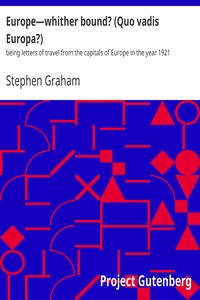Europe—whither bound? (Quo vadis Europa?) : being letters of travel from the…
"Europe—whither bound? (Quo vadis Europa?)" by Stephen Graham is a collection of travel letters written in the early 20th century, specifically in the year following World War I. This work aims to provide a reflective overview of Europe’s post-war condition as the author journeys through various capitals, seeking to capture a snapshot of the continent's state and its path forward. The book discusses themes such as societal change, national identity, and the
lingering effects of conflict, focusing on the collective European experience during a time of uncertainty. The opening of this travelogue introduces the author in Athens, where he contemplates the decline of Europe and laments its loss of ideals, juxtaposing the ancient city's historic significance with its modern realities. He paints a vivid picture of contemporary Athens, observing the indolent yet elegant lifestyle of its people and critiquing the pervasive anti-Greek sentiment among neighboring nations. As Graham navigates the streets, he reflects on the social dynamics and political tensions that shape the region in 1921, setting the stage for an exploration of the complexities that define post-war Europe and suggesting that the continent must confront the ramifications of its past to find a way forward. (This is an automatically generated summary.)
Read or download for free
| How to read | Url | Size | |||
|---|---|---|---|---|---|
| Read now! | https://www.gutenberg.org/ebooks/21499.html.images | 373 kB | |||
| EPUB3 (E-readers incl. Send-to-Kindle) | https://www.gutenberg.org/ebooks/21499.epub3.images | 252 kB | |||
| EPUB (older E-readers) | https://www.gutenberg.org/ebooks/21499.epub.images | 256 kB | |||
| EPUB (no images, older E-readers) | https://www.gutenberg.org/ebooks/21499.epub.noimages | 212 kB | |||
| Kindle | https://www.gutenberg.org/ebooks/21499.kf8.images | 486 kB | |||
| older Kindles | https://www.gutenberg.org/ebooks/21499.kindle.images | 459 kB | |||
| Plain Text UTF-8 | https://www.gutenberg.org/ebooks/21499.txt.utf-8 | 349 kB | |||
| Download HTML (zip) | https://www.gutenberg.org/cache/epub/21499/pg21499-h.zip | 249 kB | |||
| There may be more files related to this item. | |||||
Similar Books
About this eBook
| Author | Graham, Stephen, 1884-1975 |
|---|---|
| Title | Europe—whither bound? (Quo vadis Europa?) : being letters of travel from the capitals of Europe in the year 1921 |
| Original Publication | Toronto : The Ryerson Press; D. Appleton and Company, 1922 |
| Note | Reading ease score: 70.6 (7th grade). Fairly easy to read. |
| Credits | Produced by Al Haines |
| Language | English |
| LoC Class | D: History: General and Eastern Hemisphere |
| Subject | Europe -- Description and travel |
| Category | Text |
| EBook-No. | 21499 |
| Release Date | May 16, 2007 |
| Most Recently Updated | Jan 7, 2008 |
| Copyright Status | Public domain in the USA. |
| Downloads | 150 downloads in the last 30 days. |
| Project Gutenberg eBooks are always free! | |


